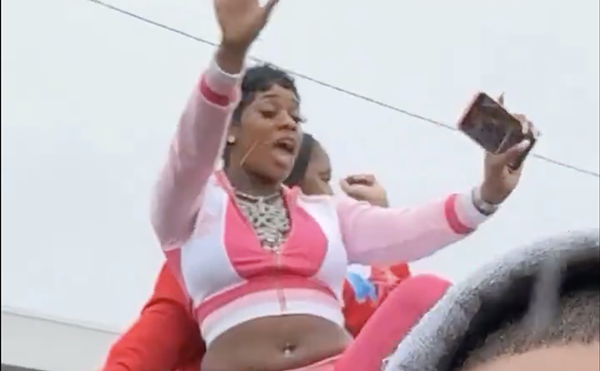Moore's now back with the band just in time for its current tour, and FFTL will enter the studio in early 2007 to record its major-label debut with planned assistance from Robinson and Borland once again.
I spoke with guitarist Travis Richter, who was calling from his apartment in Orlando, Florida.
Rob Trucks: Are you nervous at all about Sonny's recent surgery?
Travis Richter: Oh, no. I haven't even thought about it, to be honest with you.
But that's kind of a huge deal, you know, to have a singer who's not allowed to sing.
Yeah, I guess. I mean, we've been through it before already, and, like, you can tell when he talks his voice is clear and, like, smooth-sounding. He'll be ready. He's seeing some of the best people in the industry for it. I mean, I know nothing about it, so there's no point in me worrying about it.
That makes sense. So how far along are you with material for the next album?
When we were on Warped Tour, it was like: Sonny's got to stop singing. He needs to go and have the surgery, or we're not going to be ready for the fall, you know, because we won't have the time for him to recover. That's not some easy thing to recover from. So we made the move for Sonny to have the surgery. And when we did that, we were like, "Well, let's start writing and see what happens," you know. And we wrote tons of songs. And then we just got to this point where we really wanted to challenge ourselves, and then we started writing songs that we just started, like, really loving. And we've done it in this really weird way where we started the record from beginning to end, writing it in order.
Wow. Like already sequenced?
Yeah, and having everything kind of segue naturally. And it's cool, because it really turns into this game of, like, "Which direction do you want the album to go?" So it's a really cool thing we've been doing.
How far along are you?
As far as this idea goes, we're three songs in, but we already have a good idea for, like, the fourth and fifth one. It's just an idea. It might not even be the best thing. We just wanted to do something, you know, different. Me and Matt [Good, guitarist] just kind of do everything from a very natural standpoint when we're writing because, like, for us, it's all about waiting for that thing inside you to tell you it's time to create, and then you just zone in. Like we get into this really crazy zone where we'll write these really elaborate songs and really elaborate demos in like two-and-a-half hours and stuff. And right now, at this point in time, it's all just, like, sample drums, because we like to present our entire idea to the band so that they can have some input in the flow and so they can see our complete vision for the song, so when they go to write their instrument's part they know exactly what it is that will make the song the best that it can be, you know.
You obviously create obstacles for yourself in the songwriting process, but you've got other obstacles too. Sonny's had two vocal surgeries, you're about to make your major-label debut, and you're being sued by your former bass player. That's an awful lot of drama for such a young band.
Yeah, well, it's like we're dealing with Jon trying to sue us and stuff like that, but it doesn't like really weigh us down any, you know?
It's just stuff you deal with and then you move on from there?
Yeah, my view on life is pretty askew from your average one. Like I tend to look at things from a very faraway perspective, so that I don't, you know, freak out over something like somebody trying to sue you for ten million dollars when the most money you've ever seen in your life is like five thousand.
Your producer, Ross Robinson, said that you're like the father of From First to Last. Do you feel that way?
Uh, I think I try to be. I try to be the responsible one as far as, like, the business stuff and planning and visionary-type things, but I'm also like a delegator. Every person in our band has such amazing gifts and qualities, like stuff that you wouldn't really think, and I really push them to exercise those inside the band. It's kind of like our time to shine, and our time in life, and we need to take advantage of it and really use it for stuff that we're going to be thankful for later.
And one of your gifts, I guess, is that you're responsible.
In a sense. I'm probably more of a kid than other people in the band, but for me it's like a game. It's really about your brain power when you're in the music industry. I want things to be good. I desire for things in music to be good, and I think the way I do that is just by trying to make as many good decisions on a personal level [as] with my band.
You mentioned the music industry. Is there a band that's gone before you that you see as a kind of role model as far as business and artistic choices?
You know, I would never want to jock this band or, you know, steal their ideas and stuff, but a definite band who has had a good, solid career that I look up to is Nine Inch Nails, especially on the business end. I just like how it's been a very consistent artistic vision that's [been] maintained and stood the test of time, because, you know, they started in the late '80s and have been through many different fads of music. It's very similar to Tool also. Just really trying to stay true to yourself. Being true to yourself and just creating. Like, you're only new once, and after that you're old.





